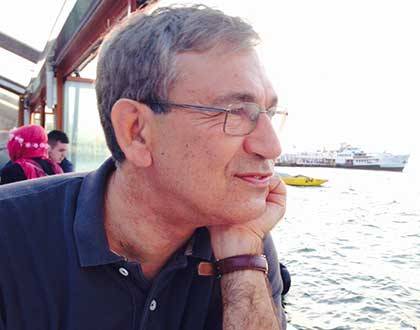Nobel Laureate in Literature Visits Duke Thursday
Turkish author Orhan Pamuk will read from his latest book

Orhan Pamuk, a Turkish author and Nobel laureate who has spent a long literary career making the political personal, brings his perspective to Duke Thursday for a reading from his latest novel.
Pamuk will discuss Nights of Plague with Erdağ Göknar, an associate professor of Turkish in the Department of Asian and Middle Eastern Studies at Duke. The event takes place from 6:30 to 8 p.m. Thursday at White Lecture Hall on East Campus. Registration is required.
Göknar translated Pamuk’s 2001 novel, My Name Is Red, into English and teaches a class about his work.
“Pamuk is one of the foremost practitioners of the global novel writing today and as such his visit is significant to Duke’s vision of international education,” Göknar said. “As an author-intellectual, he’s able to provide important comparative insights into our present moment; for example, the ways in which an epidemic can transform our political reality.”
In this Q&A, Göknar discusses the work of Pamuk, who won a Nobel Prize for literature in 2006, and his impending visit to Duke.
What makes Pamuk such an important figure?
Pamuk’s importance as a writer is that he makes issues of present-day concern such as a military coup or an epidemic the basis of literary form. He is one of the few writers able to comment on issues of historical and political import through characters who live what might be termed an intimate geopolitics that transforms them and enlightens the reader about their daily lives. His novels provide readers with comparative contexts for understanding characters in crisis – and themselves.
How important has his writing been to your work?
Pamuk’s work is one of the foci of my research and scholarship. I first met him when I was in graduate school and we’ve been friends for the last twenty years. I translated one of his well-known novels, My Name is Red, and have written a book on the cultural politics of his fiction. At Duke, I teach a seminar on his novels, which are insightful windows onto Turkey, its culture, history, and politics.
What would you recommend as an entry point to his work?
Pamuk’s a multifaceted writer who likes to mix genres, so there are a few good first reads depending on interest. For example, for readers interested in travelogues and memoir, Istanbul is a good introduction into late Ottoman and Turkish modernity, and the writer’s place in that history. Art history buffs would like My Name is Red, which addresses Islamic miniatures and book arts. Readers interested in Middle East politics would enjoy Snow, a novel that exposes coups and conspiracies – even shedding some light on what we have experienced in this country recently (the term “deep state”, a favorite of President Trump’s, first emerged in Turkish politics).
What can you tell us about Pamuk’s new book?
Nights of Plague develops a number of Pamuk themes like modernity, revolution, and state power in Middle East contexts. It’s a story about the end of the Ottoman Empire and national self-determination told through the allegory of a plague epidemic. While it relies in part on contagion as a political allegory, it also dramatizes the experience of identity formation in the Middle East in an ironic mode. In this regard, it’s a classic Pamuk novel at the intersection of Islamism, secularism and state power.